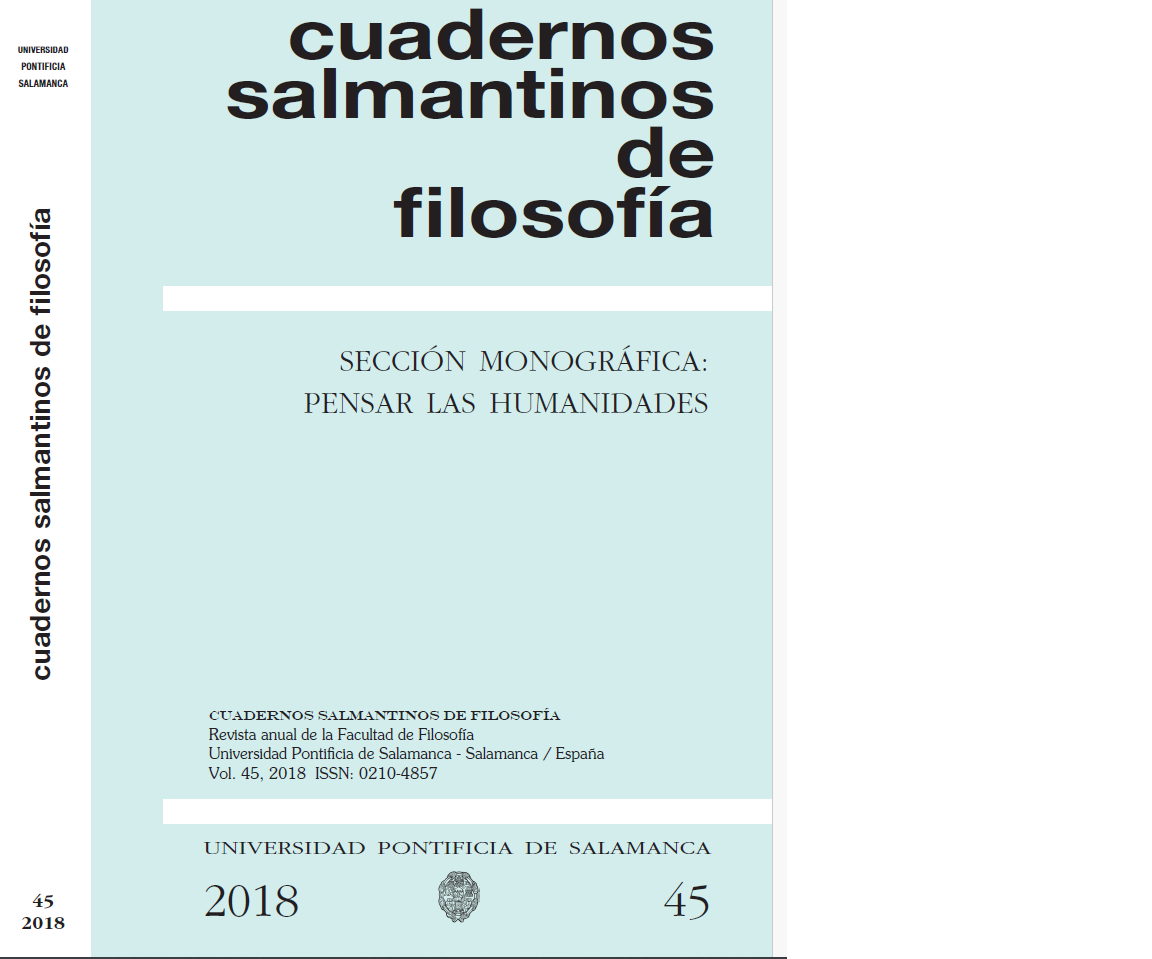The best of all possible worlds
Main Article Content
The concept of a possible world is used to express modal arguments. In his article we trace back the tentative beginnings of the idea of possible worlds in the works of Antonio Rubio that had a great influence in the later discussions. First we reconstruct Suárez’ criticism against Aristotle’s claim that there existed only one world. Next, we examine the proposal developed by Gottfried Leibniz who assumed that there are more possible worlds. In this context the argument of the Theodicy is presented that regarded possible worlds as procedures of God’s mind and used the notion to argue that our created world is supposed to be “the best of all possible worlds”. This argument is based both on the field of modal logic and on the procedures of functional calculus.
Article Details
References
Leibniz, G. W., Sämtliche Schriften und Briefe, Ed. Berlin-Brandenburgischen (antes: Deutsche; anteriormente: Preußischen) Akademie der Wissenschaften zu
Berlin und der Akademie der Wissenschaften in Göttingen, Akademie-Ausgabe, VI. Reihe, Philosophische Schriften. Darmstadt, 1930, Berlín: De Gruyter, 1962
ss. < https://leibnizedition.de/reihen/reihe-vi/> VII. Reihe, Mathematische Schriften, Berlín: De Gruyter, 1990 ss. < https://leibnizedition.de/reihen/reihevii/>.
Couturat , L. (ed.), Opuscules et fragments inédites des Leibniz. (Paris, 1903) Hildesheim: Olms, 1960.
Leibniz, G. W., Generales Inquisitiones de Analysis Notionum et Veritatum –Allgemeine Untersuchungen über die Analyse der Begriffe und Wahrheiten, Ed. Trad. Y con comentarios por F. Schupp. Hamburg: Meiner, 1982. Gerhardt, C. I. (ed.), Leibnizens mathematische Schriften, 7 vols. Hildesheim: Olms, 1962.
Gerhardt, C. I. (ed.), Die philosophischen Schriften von G. W. Leibniz, 7 vols. Hildesheim: Olms, 1962.
Leibniz, G. W., Obras filosóficas y científicas. Granada: Editorial Comares, 2000 ss.
Vorausedition zur Reihe VI – Philosophische Schriften – in der Ausgabe der
Leibniz-Forschungsstelle Münster. Forschungsvorhaben der Akademie der Wissenschaften zu Göttingen. Münster, 1981 ss. <https://www.uni-muenster.de/Leibniz/
db_new_032009.html> [23/08/208]
Couturat , L. (ed.), La logique de Leibniz: d’après des documents inédits. Paris: F. Alcan, 1991.
Heinekamp, A.; Robinet, A. (eds.), Leibniz: the best possible world. (Leibniz: le meilleur des mondes. Table ronde organisée par le Centre National de la Recherche Scientifique, Paris et la Gottfried-Wilhelm-Leibniz-Gesellschaft, Hannover, Domaine de Seillac (Loir-Et-Cher), 7 au 9 juin, 1990.), Studia Leibnitiana. Sonderheft, 21, Stuttgart: Franz Steiner Verlag, 1992.
Knebel, S. K., “Necessitas Moralis ad Optimum: Zum historischen Hintergrund der Wahl der besten aller möglichen Welten”, Studia Leibnitiana, 23 (1), 1991, 3-24.
—, “Scientia media. Ein diskursarchäologischer Leitfaden durch das 17. Jahrhundert”, Archiv für Begriffsgeschichte, 34, 1991, 262-294.
—, Wille, Würfel und Wahrscheinlichkeit. Das System der moralischen Notwendigkeit in der Jesuitenscholastik 1550-1700, Hamburg: Meiner, 2000.
Kukkonen, T., “Possible Worlds in the Tahâfut al-Tahâfut. Averroes on Plenitude and Possibility”, Journal of the History of Philosophy, 38/3, 2000, 329-348.
—, “Possible Worlds in the Tahâfut al-Falâsifa: Al-Ghazâlî on Creation and Contingency”, Journal of the History of Philosophy, 38/4, 2001, 479-502.
Langston, D. C., “Scotus and Possible Worlds. En: Knowledge and the Sciences in Medieval Philosophy, S. Knuuttila, R. Työrinoja, St. Ebbesen (eds.), Vol. II, Helsinki: Yliopistopaino, 1990, 240-247.
Leibniz, G. W., Fundamenta calculi Rationis, en. Die Grundlagen des logischen Kalküls. Hamburg: Meiner, 2000.
—, Ensayos de Teodicea. Sobre la bondad de Dios, la libertad del hombre y el origen del mal. Trad. por Tomás Guillén Vera. Granada: Comares, 2012.
Lenzen, W., Calculus Universalis. Studien zur Logik von G. W. Leibniz. Paderborn: Mentis, 2004.
—, “Leibniz’s Ontological Proof of the Existence of God and the Problem of “Impossible Objects””, Logica Universalis, 11, 2017, 85-104.
Molina, L. de, Concordia liberi arbitrii cum gratiae donis, divina praescientia, providentia, praedestinatione et reprobatione, J. Rabeneck (ed.), Oña-Madrid: Collegium Maximum, 1953. [1ª ed. Lisboa, 1588].
ORIO DE MIGUEL, B., Leibniz. Crítica de la razón simbólica. Granada: Comares, 2011.
Padilla Gálvez , J., “Identität und Selbigkeit. Ontologische Interpretation der Leibnizschen Individuen”. En: V. Internationaler Leibniz‑Kongress Leibniz Tradition
und Aktualität (Ed. A. Heinekamp). Hannover: Leibniz-Gesellschaft, 1988, 685‑692.
—, Referenz und Theorie der möglichen Welten. Darstellung und Kritik der logisch‑semantischen Theorie in der Sprachanalytischen Philosophie. Frankfurt a. M.: Peter
Lang, 1989.
—, “Las lógicas modales en confrontación con los conceptos básicos de la lógica modal de G. W. Leibniz”. Volumen extraordinario: Leibniz’s Logical Calculi and their Present Developments and Applications, Theoria, 14-15, 1991, 115-127.
—, “Teoría de los mundos posibles e identidad”. En: Analogía y expresión en Leibniz, Quintín Racionero y Concha Roldán (comp). Madrid: Editorial Complutense,
, 103-109.
—, “Die Leibnizsche Behandlung kontrafaktischer Bedingungssätze”. En: Leibniz und Europa. VI. Internationaler Leibniz‑Kongreß. Hannover: Leibniz-Gesellschaft,
, 565-572.
—, “Modalisatoren und mögliche Welten in den logisch-semantischen Untersuchungen um 1686”. Nihil sine ratione. VII. Internationaler Leibniz-Kongreß, (Ed. Hans
Poser), Vorträge 2. Teil, Berlín: Leibniz-Gesellschaft, 2001, 926-933.
—, “Escritos inéditos de Leibniz. [Leibniz, Gottfried Wilhelm: Fundamenta calculi logici - Die Grundlagen des logischen Kalküls”. Mathesis, Serie II, Vol. I, N° 1 (enerojunio), 2001, 219-225.
—, “La teoría de los condicionales contrafácticos propuesta por Luis de Molina y la respuesta de G. W. Leibniz”. Estudios Filosóficos, LVIII, 2009, 333-346.
—, “Crisis y complejidad como alternativas posibles”. Leibniz en la filosofía y la ciencia modernas, Granada: Editorial Comares, 2010, 51-70.
—, “Zur Modaltheorie von Leibniz. Anmerkungen über kontrafaktische Bedingungssätze”. En: “Für unser Glück oder das Glück anderer”. Vorträge des X. Internationalen
Leibniz-Kongresses. Ed. Wenchao Li, et allii. Hildesheim: Olms, vol. V, 2016, 629-642.
—, “El mejor de los mundos posibles, reconsiderado”, Dókos. Revista filosofica, 19-20, 2017, 221-225.
POSER, H., “Die beste der möglichen Welten? Ein Topos Leibnizscher Metaphysik im Lichte der Gegenwart”, en: A. Heinekamp, A. Robinet (eds.), Leibniz: Les meilleur des mondes, Studia Leibnitiana, Sonderheft 21, 1992, 23-36.
—, “Von der Zulassung des Übels in der besten Welt. Über Leibnizens Theodizee”, Synthesis Philosophica, 12, 1997, 461-477.
Rateau , P., Leibniz et le meilleur des mondes posibles. París: Classiques Garnier, 2015.
REDMOND, W., “Instrumenta Sciendi. Lógica y ciencia en Antonio Rubio”, Tópicos, 34, 2008, 105-139.
ROBINET, A., G. W. Leibniz : le meilleur des mondes par la balance de l’Europe. Paris: PUF, 1994.
ROLDÁN, C., Leibniz. En el mejor de los mundos posibles. Barcelona: Batiscafo, 2015.

